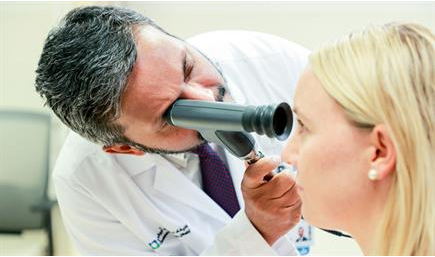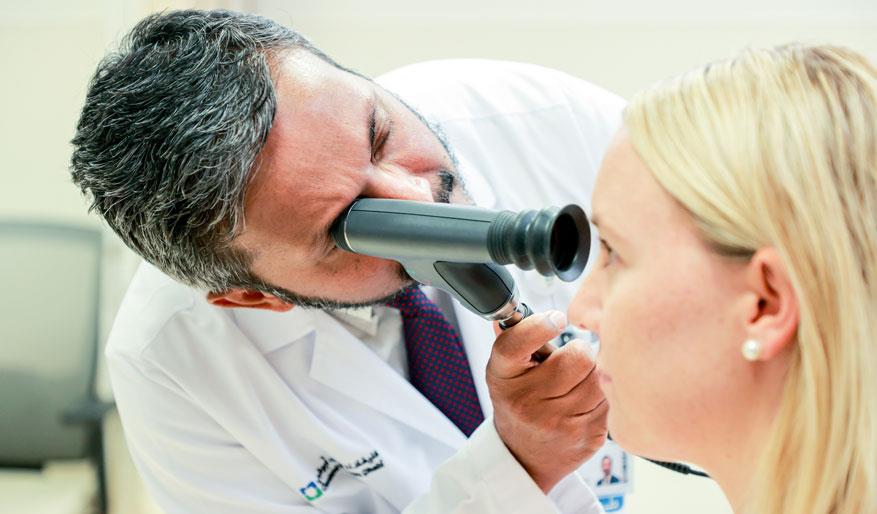Our Doctors
Meet all the doctors from Cleveland Clinic Abu Dhabi.
View Doctors
We answer some of the most common concerns people living with MS might have about Covid-19

What you need to know
Covid-19 has been a part of our lives for a long time now. Caused by the virus ‘SARS-CoV-2’, it first appeared in late 2019 and quickly spread around the world. For most people who become infected with Covid-19, symptoms include cough, fever, muscle aches, loss of sense of smell and taste, difficulty breathing, sore throat, feeling tired, and headaches. These symptoms usually get better on their own, within a few days or weeks.
But for some people, especially those living with a chronic condition such as diabetes, hypertension, or heart disease, the symptoms can be much worse. The virus can cause a severe respiratory infection which can make breathing difficult, with some people needing the help of a respirator.
Multiple sclerosis, or MS, is a chronic condition, so you may be worried about the risk that the Covid-19 virus poses to your health. We answer some of the most common concerns people living with MS might have.
I have MS – am I at greater risk of catching Covid-19?
People with MS have exactly the same risk of catching Covid-19, and becoming infected with it, as the general population.
However, those who are severely affected by MS, such as those who have difficulty swallowing, who have progressive MS, who are bedbound or are over the age of 60, as well as people with MS and other conditions such as obesity, may be at greater risk of complications from Covid-19.
MS patients who are taking disease modifying drugs to treat their MS, may also be at an increased risk of infection (see below). These medications work to suppress the immune system and can therefore expose you to a slightly higher risk of infection, including Covid-19. However, it is very important that you do not stop taking any medication prescribed for you. Always talk to your doctor or MS nurse if you are concerned about the risk.
What are the risks associated with Covid19 for people living with MS?
Researchers in Italy have been exploring the effects of Covid-19 on MS patients and have found that people with the condition who contracted the virus did not have a worse outcome compared to the general population.
Covid-19, as with many other infections, can sometimes cause a fever. This can temporarily worsen MS symptoms. However, once the infection is cleared, the MS symptoms usually return as before. A severe Covid-19 infection could also potentially trigger a relapse. For these reasons, doctors recommend that people living with MS should take extra precautions to avoid the infection.
What can I do to protect myself from Covid-19?
Anyone with MS, including those who have received the vaccine, should take extra precautions to protect themselves from Covid-19. Precautionary measures include:
Your caregivers, friends, and family members who you live with, or who regularly visit, must also follow these recommendations.
I am taking disease modifying drugs for MS (DMDs) – what should I do?
Most DMDs do not significantly increase the risk of Covid-19 symptoms or the complications associated with the virus. Don’t stop taking any medication that has been prescribed for you and if you have any concerns about the risk, always discuss it with your MS care team.
What should I do if I catch Covid-19?
Always contact your MS care team immediately if you have any Covid-19 symptoms. They will always be on hand to talk through any concerns or questions you may have. Don’t stop taking any MS medication you may be prescribed and talk to your doctor about what you should do.
Can I get the Covid-19 vaccine if I have MS?
People with MS should receive the Covid-19 vaccine. This includes the Sinopharm, AstraZeneca, and Pfizer vaccines available in the UAE. As none of these vaccines contain a live virus, there is no risk of infection. Research shows that the vaccines are not likely to trigger an MS relapse, or have any impact on long-term disease progression. Common side effects from the vaccine include fever and body aches, which can make MS symptoms temporarily worse.
In general, the risks of COVID-19 far outweigh any potential risks from the vaccine. Based on data from previous studies of other vaccines and DMDs, having the Covid-19 vaccine is safe. It is important that family members of people with MS and anyone they live with should receive the vaccine as well.
Your MS care team are always available to talk to you, should you have concerns about Covid-19, or anything else related to your condition.